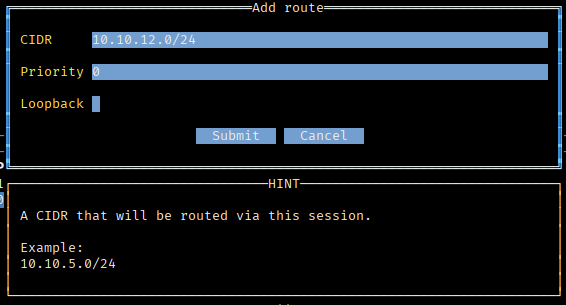Dashboard routes - ttpreport/ligolo-mp GitHub Wiki
Routes control which CIDRs are going to be routed through the target session.
Any route can be marked as "loopback route", which means that if for your sessiom with a machine with internal address of 10.20.30.40 you add a loopback route of 10.20.30.40/32, calling an address 10.20.30.40:25 from your server will actually call localhost:25 of 10.20.30.40 machine. This completely eliminates the need for port forwarding, since you can access local ports with loopback routes.
[!NOTE] Route priority works same as Linux's netlink - shortest range goes first (e.g. /32 takes priority over /24), and then lowest priority (metric) first if the prefix is the same.
Creating route
While in sessions pane, select a session you want to add a route to and access context menu by pressing Enter:

Select Add route and you will be presented with the form:

Here, you can specify a CIDR, its priority and optionally mark it as a loopback route.
The route will be applied once the relay is active.
Editing route
Navigate to the routes pane by pressing Tab, then select a route you want to remove and access context menu by pressing Enter:

Select edit and follow the same procedure as adding a new route.
Moving a route
Navigate to the routes pane by pressing Tab, then select a route you want to remove and access context menu by pressing Enter, select Move:

Select a session to move the route to from the dropdown and submit.
Removing route
Navigate to the routes pane by pressing Tab, then select a route you want to remove and access context menu by pressing Enter. Select Remove route to permanently delete it.